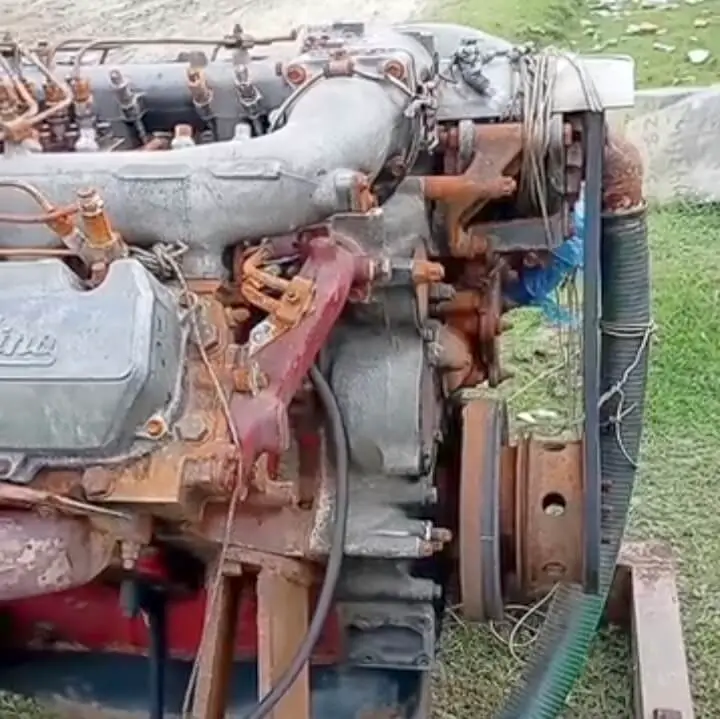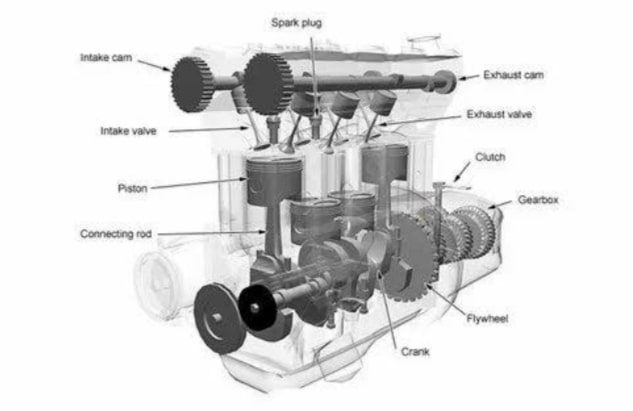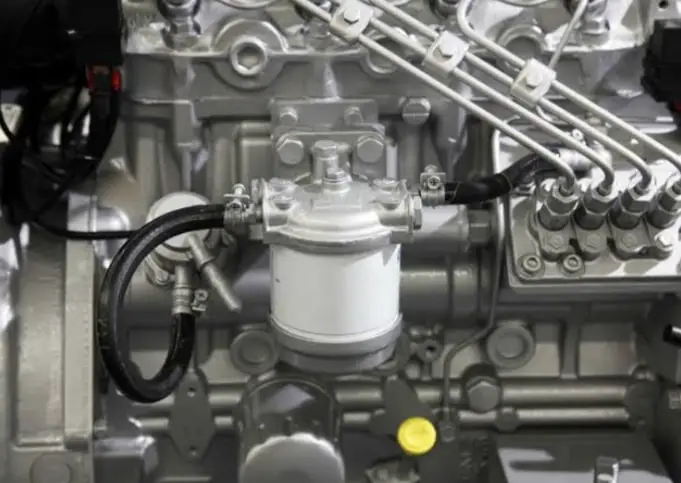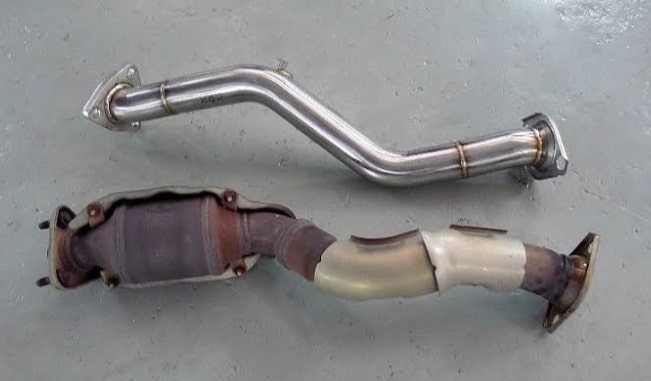As an Amazon Associate, we earn from qualifying purchases. This does not affect the price you pay or the quality of the products you buy. For more information, please read the full affiliate disclosure here.
If you have a diesel engine, you know how frustrating it can be when it turns over but does not start. You may hear the familiar clicking sound of the starter motor, but nothing else happens. The engine may also overheat or lose power as it tries to run without fuel.
There are many possible reasons why your diesel engine is turning over but not starting. Some of them are related to the starter system, some to the compression system, some to the fuel system, and some to the exhaust system.
In this blog post, we will explain each of these systems and how they affect the ignition process of your diesel engine.
Causes of a Diesel Engine Turning Over but Not Starting and How to Fix It

1. Starter System
The starter system is responsible for turning the crankshaft of your diesel engine, which produces mechanical compression that ignites the air-fuel mixture in the combustion chamber. The starter system consists of a battery, a starter motor, a solenoid, and an ignition switch.
If any of these components fail or malfunction, your diesel engine may not be able to start. Some common problems with the starter system are:
1. Weak or Dead Battery
A low or dead battery can prevent the starter from delivering enough power to crank the diesel engine. You can check your battery voltage with a multimeter or use a voltmeter to measure it across two terminals. A fully charged 12-volt battery should read around 12.6 volts when the engine is off and around 14 volts when cranking.
2. A Faulty Solenoid
The solenoid is an electrically controlled valve that connects and disconnects the battery cable from the starter motor when you turn on or off the ignition switch. If the solenoid is stuck open or closed, it can prevent or allow current flow from or to the battery, which affects the cranking power of the starter motor.
3. A Bad Ignition Switch
The ignition switch is what you use to turn on or off your engine’s electrical system. It also sends signals to other components such as lights, radios, dashboards, etc. If the ignition switch is damaged or worn out, it can prevent current from reaching or leaving other parts of your engine’s electrical system.
To fix these problems with your starter system, you may need to replace your battery, solenoid, or ignition switch with new ones.
ALSO READ:- Why White Smoke From Diesel Engines When Idling? The Reasons And Solutions
2. Compression System

The compression system is responsible for compressing and heating up air in your diesel engine’s cylinders before it enters contact with fuel injected into them by an injector pump.
The compression ratio is one of the most important factors that determines how well your diesel engine burns fuel and produces power.
If there is any problem with your compression system that reduces its efficiency or performance, your diesel engine may not be able to start properly. Some common problems with your compression system are:
1. Cracks in the Head Gasket
The head gasket is a seal between two metal surfaces (the cylinder head and the block) that prevents coolant and oil from mixing with combustion gases in the cylinders.
2. Cracks in Intake and Exhaust Valves
The intake valves are responsible for letting air into the cylinders during the intake stroke. The exhaust valves are responsible for letting exhaust gasses out of the cylinders during exhaust stroke.
3. Cracks in Pistons or Piston Rings
The pistons are cylindrical metal parts that move up and down inside the cylinders during the combustion cycle. The piston rings are thin metal bands that fit around the pistons and create gaps between them and the cylinder walls.
These gaps allow air-fuel mixtures to enter the combustion chamber but prevent combustion gases from escaping out of the cylinder. The piston rings also seal against the cylinder walls, preventing leakage of coolant, oil, and combustion gases.
4. Glow Plug Failure
Glow plugs are devices that heat up air in cold weather by passing an electric current through them. They help warm up the air-fuel mixture before it enters the combustion chamber, making it easier for diesel fuel to ignite.
If glow plugs fail, they may not be able to provide enough heat for a cold start, or they may provide too much heat for normal operation, causing problems such as rough idle, loss of power, or knocking sound.
To fix these problems with your compression system, you may need to replace cracked parts such as head gaskets, intake valves, exhaust valves, pistons, or piston rings with new ones. You may also need to replace failed glow plugs with new ones.
ALSO READ:- What Causes Engine Misfire at Idle? Top 3 Main Reasons
3. Fuel System

The fuel system is responsible for delivering fuel from tanks to injectors, where it mixes with air in cylinders before ignition during the combustion cycle.
If there is any problem with your fuel system that prevents proper delivery or mixing of fuel with air, your diesel engine may not be able to start properly. Some common problems with your fuel system are:
1. Clogged or Dirty Fuel Filter
The fuel filter is a device that removes dirt, debris, and water from the fuel before it reaches the injectors. If the fuel filter is clogged or dirty, it can restrict the flow of fuel to the injectors, causing low fuel pressure, poor fuel atomization, and incomplete combustion.
2. Faulty or Leaky fuel Injectors
Fuel injectors are devices that spray fuel into the cylinders at precise timing and pressure. If the fuel injectors are faulty or leaking, they can cause too much or too little fuel to enter the cylinders, resulting in a rich or lean air-fuel mixture, misfire, smoke, or knock.
3. Faulty or Worn Fuel Pump
The fuel pump is a device that pumps fuel from the tank to the injectors. If the fuel pump is faulty or worn, it can fail to deliver enough fuel to the injectors, causing low fuel pressure, poor fuel atomization, and incomplete combustion.
4. Contaminated or Degraded Fuel
Fuel quality can affect the performance and reliability of your diesel engine. If the fuel is contaminated with water, dirt, bacteria, or other substances, it can damage the fuel system components, cause corrosion, clogging, or fouling, and reduce the cetane rating of the fuel.
If the fuel is degraded due to oxidation, heat, or age, it can lose its volatility, viscosity, and lubricity and form gums, varnishes, or sediments that can harm the fuel system components.
To fix these problems with your fuel system, you may need to replace or clean your fuel filter, fuel injectors, or fuel pump with new ones. You may also need to drain and flush your fuel tank and refill it with fresh, high-quality diesel fuel.
ALSO READ:- Maximize the Life of Your Diesel Generator With Our Expert Engine Oil Guide
4. Exhaust System

The exhaust system is responsible for removing exhaust gases from the cylinders after combustion and reducing the noise and emissions of your diesel engine.
The exhaust system consists of an exhaust manifold, a turbocharger, a catalytic converter, a particulate filter, a muffler, and a tailpipe.
If there is any problem with your exhaust system that prevents the proper removal or treatment of exhaust gasses, your diesel engine may not be able to start properly. Some common problems with your exhaust system are:
1. Cracked or Leaking Exhaust Manifold
The exhaust manifold is a metal pipe that collects exhaust gases from the cylinders and directs them to the turbocharger or the catalytic converter.
If the exhaust manifold is cracked or leaking, it can allow exhaust gasses to escape before reaching the turbocharger or the catalytic converter, reducing the exhaust pressure, the turbo boost, and the engine power.
It can also cause the exhaust gases to enter the engine compartment, creating a fire hazard or damaging other components.
2. Faulty or Damaged Turbocharger
The turbocharger is a device that uses exhaust gasses to spin a turbine that drives a compressor that forces more air into the cylinders, increasing engine power and efficiency.
If the turbocharger is faulty or damaged, it can fail to provide enough boost to the engine, causing low power, poor acceleration, and high fuel consumption. It can also cause the turbo to overheat, leak oil, or produce excessive noise or smoke.
3. Clogged or Damaged Catalytic Converter
The catalytic converter is a device that uses a catalyst to convert harmful exhaust gases such as carbon monoxide, hydrocarbons, and nitrogen oxides into less harmful ones such as carbon dioxide, water, and nitrogen.
If the catalytic converter is clogged or damaged, it can restrict the flow of exhaust gases, causing back pressure, overheating, and loss of power. It can also cause the catalytic converter to malfunction, producing toxic or foul-smelling emissions.
4. Clogged or Damaged Particulate Filter
The particulate filter is a device that traps and burns soot particles from the exhaust gases, reducing the particulate matter emissions of your diesel engine.
If the particulate filter is clogged or damaged, it can also restrict the flow of exhaust gases, causing back pressure, overheating, and loss of power. It can also cause the particulate filter to malfunction, producing smoke, ash, or flames.
To fix these problems with your exhaust system, you may need to replace or repair your exhaust manifold, turbocharger, catalytic converter, or particulate filter with new ones.
ALSO READ:- Diesel Generator Black Smoke? Here’s How to Fix It
Final Thought
Your diesel engine turning over but not starting can be caused by various problems with your starter system, compression system, fuel system, or exhaust system. To diagnose and fix these problems, you may need to use a multimeter, a compression tester, a fuel pressure gauge, a scan tool, or other tools and equipment. You may also need to consult a professional mechanic or a service manual for your specific diesel engine model and make.
🔌 Generator Tools & Social Hub
Maximize your generator knowledge! Use our calculators and join our community for expert tips:
Stay connected for updates and exclusive content:
📘 Facebook Page 🐦 X (Twitter) 📌 Pinterest 🔒 Private Facebook GroupDiscover more from Generator Hacks
Subscribe to get the latest posts sent to your email.


